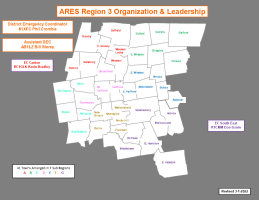Where to Find Us:
CT ARES Section 3 DEC
(District Emergency Coordinator)
Bill Storey, AB1LZ
AB1LZ@arrl.net
Wtstorey@aol.com
Alert Level: 0
Watch WWW.CTARES.ORG for near real-time level changes.
Region 3 Update - June 14, 2023
Thanks to Paul, KB1QQI for finding an typographical error with one of the frequencies in the ICS205. The error has been corrected and the ICS 205 updated. The last page of document notes the specific change. Phil, K1XFC
Become Active In Region 3 ARES
Join ARES
If you live in Region 3 and are interested in ARES, please contact me at k1xfc@arrl.net.
You can register as an ARES member on the State ARES website - www.ctares.org Once on the page go to the "Membership" tab on the left. For current memebers, please visit the membership page periodically to keep your information up-to-date.
Participate in Weekly Nets
Everyone interest in Region 3 ARES is encourged to check in to our weekly net. The net takes place every Monday at 2000 hours local (8:00 PM) on the KB1AEV Linked Reapter System. The Vernon VHF repater in the system is on 147.345, plus offset (+600 kHz), and a PL of 151.4. Other linked repeaters in the system can be found on the KB1AEV web site.
Region 3 Organization
Skywarn Weather Nets in Region 3
Weather nets are held routinely by ARES Skywarn Coordinators, and on special schedules during severe weather.
For Region 3, there is a weather net every Thursday at 9 pm on the W1HDN repeater in Tolland.
Tune to 146.790, minus 600kHz offset, PL tone 82.5.
To report severe weather, please give the information in the order below. Also indicate if it is measured, averaged, or estimated, and if it is storm total or since last report,
| Temperature | Precip intensity | Depth | Damage |
ARES is the Amateur Radio Emergency Service, the field arm of the American Radio Relay League.
Our special focus is the use of Amateur Radio for emergency communications, and the recruiting and training of a pool of skilled radio operators to be available in times of emergency.
ARES in Connecticut partners with state and municipal governments, public health entities, and non-profit providers such as the Red Cross and Salvation Army.
ARES members have their own radios and many can respond from their homes and vehicles, allowing ad hoc ARES nets to form using operators who are already in place when a disaster wipes out communications infrastructure. This means ARES functions even when the roads are blocked and the electric and telecom grids are jammed or down.
Amateur radio can be used to
- pass welfare traffic ("Aunt Minnie made it safely to the community shelter"),
- forward requests from stranded facilities ("the XYZ nursing home urgently needs oxygen bottles"),
- Pass status messages from outlying hospitals to the central reporting agency ("hospital A has 23 beds available"),
- Digitally convey sitreps, ICS forms, maps and photos to an incident command post
- Act as an email gateway to a functioning part of the Internet via long-distance HF radio to another state or country.
To keep our operators trained and equipment working, we provide Public Service communications at no charge. ARES members volunteer for service at charity races, runs, walks, parades, and other large events. Operators man checkpoints, observe along the course, circulate in large venues. They contribute to public safety, guiding first responders to where they are needed, clearing the way for emergency vehicles, and reporting incidents to the Unified Command post.
Our radios work where cell phones can't get dial tone or coverage, and are interoperable where the specialized public safety and commercial radios are not.
For a detailed list of training available, see the training page of the state ARES web site, CTARES.ORG.
IMPORTANT! Whenever there is an ARES activation, leadership will notify and assign tasks ONLY to those who have current records in the ARES member database. Go to www.ctares.org and update your record now!




